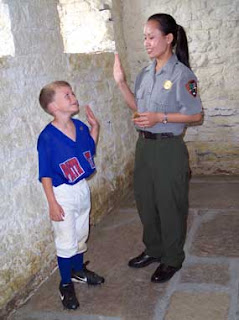It is harder than you think. Here is my list... For the moment. And a caveat: all of those selected here are "famous" and dead. I have some favorites who are not famous, and some not dead either. I'll will share some of them with you in a later post.
I have added a sentence or two to explain my choices.
Pablo Picasso
Picasso did everything, and in great quantity. And the quality, for the most part, was exceptional. When in Madrid in 1996 I saw two special Picasso exhibits celebrating the 25th anniversary of the installation of Guernica at the Museo Reina Sophia. A large sample of Picasso's "studies" - actually finished paintings for the most part - for the Guernica were on display. Picasso created over 200 of these full size paintings/studies during the month in which he created Guernica. What an astounding feat!

Walker Evans
On occasion I pretend to be a photographer. Walker Evans is one of the best photographers ever. The photographs he did for Let Us Now Praise Famous Men are among his most moving. They continue to touch my heart. Take a look at Allie Mae Burroughs and you will understand.

Modigliani
It's not just Modigliani's nudes that fascinate me, but his other paintings and his sculptures as well. There is something about the stretched out proportions that intrigues me, also a characteristic of a sculptor's work found later in my list of 10. There are not many Modiglianis in existence since he died at such a young age. I have been fortunate to see an unusually large number of them in special shows in New York, Los Angeles and Paris. This is his Red Nude painted in 1917.

Van Gogh
Ten years of productive work (and only about 5 really count) and that's all we have. How unfortunate! I have been able to see a great number of Van Goghs in Amsterdam, Paris, New York and elsewhere. All are stunning! How many artists can you say that about? I feel blessed when I am in the company of a Van Gogh. I had a tough time selecting one for this post. I'm heading for Arles this Christmas so I selected Van Gogh's Room at Arles, 1889.

Klimt
 My friend, Walter Lippincott, has had a print of Judith I, 1901 hanging in his house as long as I can remember. It fascinated me when I first saw it at Walter's almost 45 years ago. It still does now. Between 1965 and now I have come to love and admire many other of Klimt's works. My selection below is The Virgins, 1913. I selected it since I have a huge Venetian plate that is based on this painting. I love it. And I love it's source. Unfortunately, I have seen only 3 or 4 of Klimt's paintings in person. I saw a lot of his drawings at a special exhibition in Paris. I keep looking!
My friend, Walter Lippincott, has had a print of Judith I, 1901 hanging in his house as long as I can remember. It fascinated me when I first saw it at Walter's almost 45 years ago. It still does now. Between 1965 and now I have come to love and admire many other of Klimt's works. My selection below is The Virgins, 1913. I selected it since I have a huge Venetian plate that is based on this painting. I love it. And I love it's source. Unfortunately, I have seen only 3 or 4 of Klimt's paintings in person. I saw a lot of his drawings at a special exhibition in Paris. I keep looking!
Giacometti
As with Modigliani, I am taken with the elongated figures of Giacometti. I have seen many in person. They always provoke a sense of awe, a sense of humility in me. I do not know the official name of the following. I'll call it Three Figures.

Matisse
Color. Bold color. Lines and shapes. I don't think I have ever seen a Matisse I didn't like. I have seen a lot of Matisse. Years ago at the Cone Collection in the Baltimore Museum of Art. More recently on a truly overwhelming visit to The Barnes Foundation in Merion, PA. Here is Woman in a Purple Coat, 1937. You know I love purple!

Monet
Oh my. I could go on forever about Monet. How did he do it? Get close to a Monet. Move slowly backward, if the crowd will let you. It keeps changing. Walk forward. It changes again. How did he know what the painting would look like when he painted it within an arms length? A mystery to me. But a great mystery. I love Monet. I especially love his "leftovers," the paintings he did not sell. And in many cases did not sign. See them at the Musee Marmottan in Paris, a museum I did not discover for much too long a time. And do not miss perhaps the most stunning installation of any artist's works: Monet's Les Nymphéas at Musee de l'Orangerie in the Jardin de Tuileries, Paris.

Michelangelo
If you have ever visited The Accademia in Florence and seen The David in person you would need to know no more. I was there once when there were only two other people in the room. Hundreds were there on each of my next five visits. But they were fewer in number than the seeming thousands that forced my eyes permanently upward in the Sistine Chapel to view Michelangelo's great fresco ceiling. Struck with awe is appropriate when viewing Michelangelo's work. With a crowd or while alone.

Ben Shahn
If bakers can have 13 donuts in a dozen, the I can have eleven artists in my list of my top ten favorite artists. My last two are famous and dead, as are the rest on my list. But they are different in that I have had dinner (on separate occasions) with both of them Ben Shahn and Thomas Hart Benton. Shahn was a neighbor and friend of the Assistant to the Chair of the Political Science Department of Livingston College (Rutgers University) when I served as Chair 1970-72). Consequently, I was invited to dinner with Mr. Shahn and his wife. He regaled with stories of friends and foes alike, and enjoyed being able to say "I'd give my right arm for that" to accquaintances who did not know he was left handed. Since President Truman connects with my other member of this set, here in Shahn's Truman: NOTE The following photograph will be replaced soon with a photograph of a poster of Truman by Ben Shahn that is now a part of the John H. Strange Art Collection at the University of South Alabama.

Thomas Hart Benton
Thomas Hart, as I knew him, lived across the street from my uncle Randall Jessee in Kansas City, MO. There were both friends of President Truman and the three of them gathered in the basement of my uncle's house to drink eggnog and swap stories every Christmas season. Thomas Hart painted the mural that is the centerpiece of the Truman Library in Independence, MO. President Truman and my uncle also contributed to the painting. If you look closely you can't miss their brush strokes in the sky on the far right of the mural. My uncle and my aunt both served as models for some of the figures in the mural. Uncle Randall is immediately to the left of the covered wagon above the door. Aunt Fern sits to the right and slightly below that same wagon. Meeting artists in person increases the chances for them being included in your top ten. Ben Shahn and Thomas Hart Benton merit their place on my list on their own. But knowing them helps!
Independence and the Opening of the West

and Persephone, 1939. I can't figure out why, but I feel a need to include it in my post!













